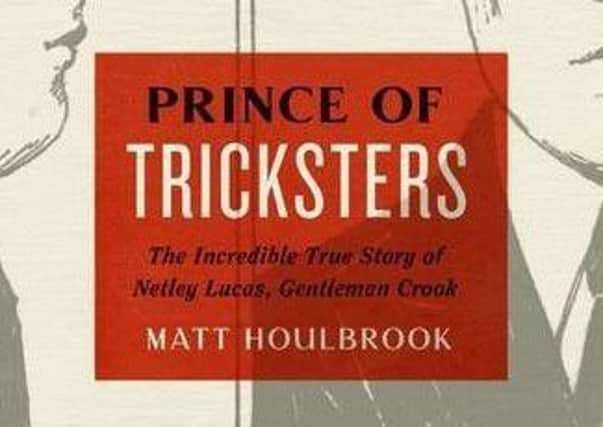Book review: Prince of Tricksters by Matt Houlbrook


Prince of Tricksters by Matt Houlbrook | University of Chicago Press, 442pp, £28
Prince of Tricksters must be one of the few accounts of a con man’s exploits to begin with a list of the subject’s published works. When not scheming to relieve the gullible of their money, Netley Lucas wrote seven books under his real name, including a 1924 autobiography that traced his early criminal career.
Advertisement
Hide AdSo it’s fitting that he ultimately turned his hand to literary fraud; his most audacious scam was a series of fanciful biographies of European royalty. Queen Mary flagged the inaccuracies in Lucas’ 1930 account of her life (purportedly authored by “Charlotte Cavendish,” one of many aliases) and deposited the annotated copy in the Royal Archives, to alert historians and researchers to the “number of inventions” it contained.
In Prince of Tricksters, historian Matt Houlbrook has uncovered the countless frauds perpetuated by one of Britain’s most brazen con artists – a relentless huckster who fooled aristocrats, journalists, publishers and just about everyone else he encountered.
Lucas launched his criminal career as a teenager, impersonating nobles and war heroes to dupe hotel clerks and wealthy acquaintances. All he needed, he recalled, was “sufficient nerve to bluff things out and a tongue sufficiently glib to tell a convincing story.” He was, Houlbrook argues, a product of his times. The horrors and disruption of the First World War left 1920s British society in a state of flux. Class lines blurred, allowing people to assume new roles with ease and creating a milieu where a “gentleman crook” with a plausible backstory could thrive.
After several stints in jail and a failed bid to set up a bogus employment agency in Canada (he was arrested and deported back to Britain in the mid-1920s), Lucas reinvented himself. Drawing on his experiences behind bars and his underworld contacts, he earned fame – and a considerable legitimate income – as an author, journalist and amateur criminologist. He became a media darling, a reformed felon with insights into the criminal mind. The Scotsman praised him as a “skillful” writer and found one of his books “lively and interesting.”
Lucas’ world unraveled in 1927, when a “scoop” about an unsolved murder was denounced as a hoax. A subsequent New York Times investigation exposed how he had embellished his past crimes to sell books. His final gambit, more than a dozen royal biographies churned out between 1928 and 1931, ended with a conviction for defrauding a publisher and another jail term.
Houlbrook, a professor of cultural history at the University of Birmingham, offers a thorough and thought-provoking examination of the life of this mischievous and elusive figure. The depth of his research is astounding; he seems to have uncovered (and included) every scrap of information that deals with Lucas and his tumultuous times. As a result, the swindler’s intriguing story is sometimes buried under layers of documentation, context and analysis.
Advertisement
Hide AdHoulbrook offers some playful surprises, rendering one episode from Lucas’ life into a snippet of screenplay and beginning the book with an affectionate “letter of love to my impossible subject.” And there are intriguing explorations of the challenges historians face when untangling truth from fiction, especially when writing about someone who lied about so much for so long.
Prince of Tricksters will reward patient readers with tales of the audacity of Lucas and other con men, as well as insights into the forces transforming British society in the interwar years. But Netley Lucas, who knew a thing or two about telling stories and working an audience, no doubt would have been disappointed to find himself so often upstaged as the star of the show. n
• Dean Jobb is the author of Empire of Deception, the saga of con man Leo Koretz and the oil swindle that rocked 1920s Chicago, www.deanjobb.com